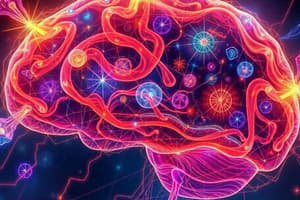Podcast
Questions and Answers
What is negative feedback in a physiological context?
What is negative feedback in a physiological context?
What is jet lag caused by?
What is jet lag caused by?
Why do people find it easier to adjust to crossing time zones going west?
Why do people find it easier to adjust to crossing time zones going west?
What is the effect of prolonged elevations of cortisol on the brain?
What is the effect of prolonged elevations of cortisol on the brain?
Signup and view all the answers
What type of schedule do people who work on a night shift, such as midnight to 8 a.m., follow?
What type of schedule do people who work on a night shift, such as midnight to 8 a.m., follow?
Signup and view all the answers
What is the term for the process of adjusting to a new schedule by going to sleep earlier and awakening earlier?
What is the term for the process of adjusting to a new schedule by going to sleep earlier and awakening earlier?
Signup and view all the answers
What is the result of CCK stimulating the vagus nerve?
What is the result of CCK stimulating the vagus nerve?
Signup and view all the answers
What happens to an animal that eats a smaller than usual meal due to CCK?
What happens to an animal that eats a smaller than usual meal due to CCK?
Signup and view all the answers
What is the primary source of energy for the brain?
What is the primary source of energy for the brain?
Signup and view all the answers
What happens to insulin levels when the blood glucose level falls?
What happens to insulin levels when the blood glucose level falls?
Signup and view all the answers
What stimulates the liver to convert stored glycogen back to glucose?
What stimulates the liver to convert stored glycogen back to glucose?
Signup and view all the answers
What is the result of glucose entering cells?
What is the result of glucose entering cells?
Signup and view all the answers
What is the primary signal for ending a meal?
What is the primary signal for ending a meal?
Signup and view all the answers
Which nerve conveys information about the stretching of the stomach walls?
Which nerve conveys information about the stretching of the stomach walls?
Signup and view all the answers
What is the main function of cholecystokinin (CCK) in the duodenum?
What is the main function of cholecystokinin (CCK) in the duodenum?
Signup and view all the answers
Which part of the small intestine releases oleoylethanolamide (OEA)?
Which part of the small intestine releases oleoylethanolamide (OEA)?
Signup and view all the answers
What is the role of the stomach in regulating eating?
What is the role of the stomach in regulating eating?
Signup and view all the answers
Why does the stomach hold its contents and fill more quickly than usual after eating?
Why does the stomach hold its contents and fill more quickly than usual after eating?
Signup and view all the answers
What is the effect of nicotine on appetite?
What is the effect of nicotine on appetite?
Signup and view all the answers
What is the major concern regarding obesity and anorexia?
What is the major concern regarding obesity and anorexia?
Signup and view all the answers
What is a possible reason why people with psychological distress may eat rich foods?
What is a possible reason why people with psychological distress may eat rich foods?
Signup and view all the answers
What is a characteristic of people with Prader-Willi syndrome?
What is a characteristic of people with Prader-Willi syndrome?
Signup and view all the answers
What is a common feature of bulimia nervosa?
What is a common feature of bulimia nervosa?
Signup and view all the answers
What is the age group mostly affected by bulimia nervosa?
What is the age group mostly affected by bulimia nervosa?
Signup and view all the answers
What prepares the uterus for the implantation of a fertilized ovum?
What prepares the uterus for the implantation of a fertilized ovum?
Signup and view all the answers
When is a woman's fertility highest?
When is a woman's fertility highest?
Signup and view all the answers
What hormone is necessary for milk production in humans?
What hormone is necessary for milk production in humans?
Signup and view all the answers
What influences brain development and emotional expression recognition?
What influences brain development and emotional expression recognition?
Signup and view all the answers
What induces parental behavior in females of many mammalian species?
What induces parental behavior in females of many mammalian species?
Signup and view all the answers
What increases when a woman is pregnant?
What increases when a woman is pregnant?
Signup and view all the answers




